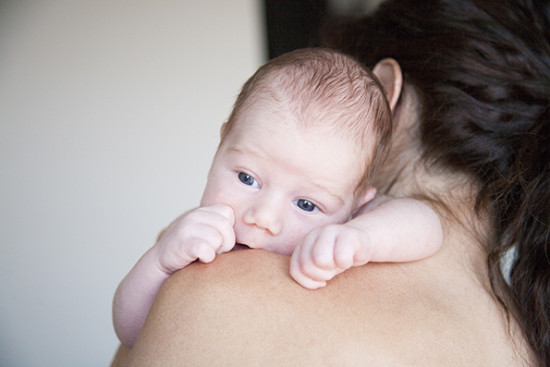Everyone knows that pregnancies last three trimesters – so what exactly is the Fourth Trimester? We explain what this crucial stage is, and what it means for you and baby

When tennis superstar Serena Williams admitted that she burst into tears when she couldn’t find her baby’s bottle, new mums around the world could relate exactly to how she felt.
Serena explained that those early days, when she wanted to be ‘perfect’ for her daughter Olympia but found the pressures of motherhood overwhelming, were like the ‘Fourth Trimester’.
But what is it? Kathryn Kelly, NCT antenatal teacher, explains: ‘The Fourth Trimester is a way of describing the period after birth when both parents and baby are adjusting to their new lives.
‘We think of other trimesters as being three months long, and we can think in terms of roughly another three months after the birth to make the adjustments to being a new family.’

Having been in your warm womb for nine months, your baby has now got to get used to a sensory overload of sights, sounds and smells, as well as a frequently colder environment where they’re not constantly supported by your protective amniotic fluid.
Kathryn says: ‘Babies have been used to being fed continuously, sleeping when they want to, and being rocked in the cosy embrace of their mum’s tummy. When babies are born we introduce gaps between feeds, and put them in a different place to sleep – it’s no wonder that they can find this scary, and it’s natural that they cry to express their fears.’
Understandably, babies are likely to cry more in this three-month period than any other time in their life. But however logical it might be, it doesn’t make this period any easier for new parents.
Knowing that other parents are going through the same experience, and thinking of this period as the fourth trimester, might help.
‘Parents describe it as a very useful concept, which reminds them that it is OK to find the early days with a baby hard. It is a period of transition, where women become mums, men become dads, and babies adjust to life outside the womb,’ Kathryn says.

Fundamentally, the closer your baby feels to you, the happier they will be.
According to Kathryn: ‘Anything that mum, dad or other carers can do to replicate the womb-like world will help their baby feel safe. And when we feel safe, we thrive. For your baby, this means holding them close, perhaps in a sling, so they feel the warmth of your body, hear your heartbeat, and are gently rocked as you go about your day (or night).
‘Feeding for babies, just like for adults, is about more than just nutrition, it’s also social – a way of sharing and being with those we care for. Feeding your baby whenever they they want to will support their emotional development, as well as their physical and intellectual development.
‘Your baby will sleep when they’re tired, and you will both feel safer if they’re close to you. Many parents tell me that in the early days their baby won’t sleep in their Moses basket or crib, but only when they’re held by a parent. This is perfectly normal and understandable when you think about the baby’s point of view. It’s important that parents find out about the safer sleep guidelines, and work out a way of sleeping that suits them as a family.’
No. Despite some people saying that babies need to ‘learn’ that you won’t rush to pick them up every time they cry, in this crucial Fourth Trimester period you can’t care for them too much. In fact, the more you look after them when they’re upset, the more reassured and confident they’ll be.

Even if you’re not an international tennis champion, parents who have gone from living busy, independent lives, can find the sudden change to around-the-clock care for a completely dependable infant hard.
Add to that the need to recover from a traumatic or difficult birth, and you can understandably feel like you’re the one in need of a little TLC!
Kathryn says: ‘With the emotional changes in a woman’s body, plus the realisation of the enormous responsibility of having a baby, new mums can feel overwhelmed and tearful at times.
‘Partners can be dealing with their own response to the birth, their changing identity, and strong feelings about protecting and providing for the family. All of these feelings can also be affected by the way both mum and her partner were parented themselves.’
As with all stages of early parenthood, it’s worth remembering that this stage will pass. In what seems no time at all, you might be looking back at the period with fondness at how tiny and attached to you your baby was when they were first born.
However, that is not to downplay how challenging the Fourth Trimester can be for parents. When you’re in it, it’s all-consuming. You can feel like you don’t know what you’re doing and you’re constantly one step behind.

If you think in terms of the first three months of your baby’s life being a Fourth Trimester, it can be easier to take the pressure off getting back to ‘normal’.
You wouldn’t have been trying to rush around tidying the house and welcoming endless visitors when you were heavily pregnant, so don’t put pressure on yourself to do it now.
‘When women are discharged from healthcare some people might think that means they should be able to return to normal life, but there is a long period of adjustment and care needed at home,’ says Kathryn.
‘Friends and family can support new parents with food, help around the house, and reassurance that they are doing a great job of looking after their baby.’
This is especially important for mums who are raising their baby alone, in which case asking for help from friends and family in advance can help ensure you get the support you need.
Kathryn adds: ‘Having very modest aims in the early days – getting outside most days (perhaps a short walk around the block), eating well, resting as much as possible – will change over time to meeting up with friends regularly, getting some exercise every day, and doing the most necessary housework.’

‘As babies grow and change, things that seemed easy one day might feel very difficult another,’ Kathryn says. ‘A baby’s crying tends to peak at around week six, which can mean that parents feel they must be doing something wrong, or that there is a problem with their baby. However, this is normal, and has usually reduced by three months.
‘Parents report the excitement and happiness that comes when they see their baby is starting to interact with them, including smiling for the first time.’

‘Part of the challenge of this early period is the feeling that there is so much to learn, and to worry about,’ explains Kathryn. ‘Using safe sources when looking for information about caring for yourself or your baby will reduce anxiety.
‘Reputable sources such as NCT practitioners and the website, or NHS health professionals and are a good place to start. Avoid sources of information (including people or media) who make you feel bad about your parenting, and stick with people who you trust and who support you.
‘Although things can feel like they’re getting harder in the early weeks, most people are feeling much better by around three months after the birth, and some will feel fine before that. If parents are still finding life a real struggle at that point they might consider talking to a health professional, or seeking more support from friends and family, to help them until they are feeling more in control.’
Find an NCT group near you to share your experiences of being a new mum.
Read more about being a parent in the early days here.
Your body after birth – get information and advice on how to deal with common problems.